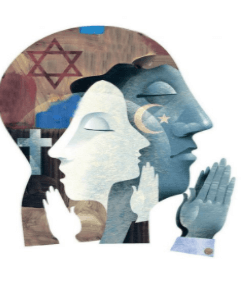
A story is told about a great rabbi who came one day to the study hall. The room was filled with people learning the Talmud, sitting across from each other, arguing and debating the minutiae of Talmudic passages.
This was Torah study at its finest. But the rabbi looked and looked and nowhere could he find his own son.
Having an inkling of where he might find him, the rabbi went out to the nearby forest. And, lo and behold, there was his son, communing with nature.
“I don’t understand,” said the father. “Why do you come out here to the forest?”
“I come to find God,” said the son.
“But God is everywhere,” replied the father. “God is in the study hall just as God is in the forest. God is the same everywhere.”
“Yes. God is the same everywhere,” said the son. “But I’m not.”
I am an Orthodox rabbi who heads a rabbinical school that trains open and modern Orthodox rabbis. Most of my day, every day, is spent in the study hall, among the books, studying the Talmud and Jewish law, and teaching these to my students.
This intellectual engagement is challenging and thrilling, and for me it is also a profound religious experience. I find my God, my world, in the study hall.
And yet such an experience can be limiting. It privileges one form of engagement and knowing—the intellectual—over all others. And the traditional rabbinic study hall is a closed environment, with everyone drawing on the same texts, and where everyone present comes from the same religious background.
At my rabbinical school, we like to pride ourselves on being open-minded, and we reach beyond those traditional limits. We engage people from different religious backgrounds; we draw on a wider range of texts and academic disciplines.
So I was not really looking to find God out in the forest or anywhere else. I was quite happy with the God and the religious world that I encountered in the study hall.
Then, out of the blue, I was invited to come and spend a week at Esalen to participate in a retreat. The retreat would bring together Muslims, Christians, and Jews of religious and secular backgrounds, to learn from one another and to find ways to work collaboratively toward peace.
I was skeptical, and had so much to do at my school in New York that I did not think I could find the time to get away. In the end, however, I decided to give it a try. And I discovered—as the rabbi’s son had—that while God is the same everywhere, I am not.
My time at Esalen allowed me to free myself from the business and the busy-ness of my day-to-day life. It also allowed me to step out of myself and my deep entrenchments, and to experience people and perspectives in ways that I was not able, or had not allowed myself, to do before.
Two experiences in particular have stayed with me. First, the late nights in the kitchen of the Murphy house, after all the programming was done; kicking back, having wine and cheese, and talking with Michael Murphy about the transmigration of souls. An idea I would have otherwise rejected out of hand became one I was willing to consider and explore.
Murphy is a levelheaded, scientifically-oriented and skeptical person, who himself resisted his conclusions and who invites scientists to challenge and critique the evidence. Talking to Murphy, impressed by his seriousness and his integrity, and situated in this faraway place, I was able to drop my own defenses and to consider this radically different perspective.
Second, and more germane to the goals of the retreat, were the opportunities I had to talk with Muslim men and women from the Middle East. While I did not agree with their narrative and worldview, I was able to see how the world looks through their eyes. There were difficult moments, to be sure. But almost all of the people I met impressed me with their intelligence, seriousness, and willingness to acknowledge my perspective and my point of view.
This validation was key. It enabled me to lower my own defenses. Such validation allowed for an openness I had not previously experienced—for a serious sharing and exchange of ideas. Such validation allows us to truly begin to hope that peace may be possible.
